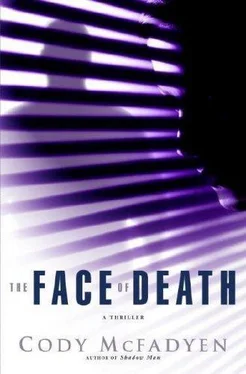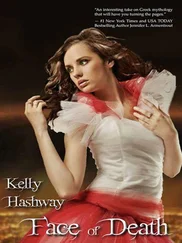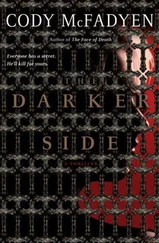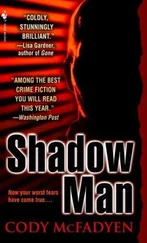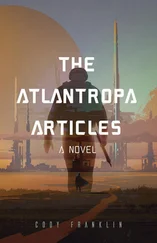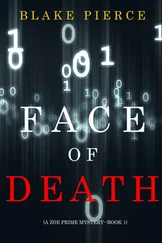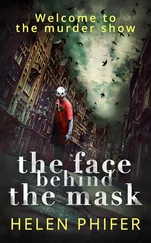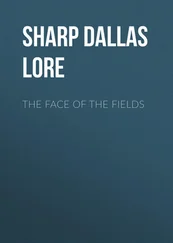" 'Be not afraid, but trust in God,' he said.
"We left the car and the guard fell in behind us. The boy turned without warning and he punched the guard in the groin. The guards were used to our obedience, and so this one was caught by surprise. He doubled over in pain and screamed in rage.
" 'Run!' the boy told me.
"I stood there, trembling. Unsure. Ever the victim.
" 'Run!' he said again, only this time it was a roar, the voice of an angel, and he fell upon the guard, biting and kicking.
"His words reached me.
"I ran."
Cabrera rubs his forearm with one hand. I can see him there in the moment, but I can see it mixing with the present as well. The fear of indecision, the joy of making an escape from hell. The guilt of taking what the boy had offered, and of leaving him behind.
"I do not need to tell you the story of every moment, month, or year after that. I did escape, from that hell on earth. I came home to my family. I lived for many years after that as a troubled boy, and later as a troubled man. I was not a saint, I was often a sinner, but--and this is the most important thing of all--I had lived. I had not committed suicide. I had not damned my immortal soul. Do you understand? He had saved me from the worst fate of all. Because of what he did for me, I will not be barred from heaven."
I do not share Cabrera's beliefs. But I can feel the strength of his faith, the succor it provides him, and it moves me.
"I came to America," he continues. "I believed in God, but I was troubled, always troubled. I'm ashamed to say that I did drugs at times. That I saw prostitutes. I contracted the virus." He shakes his head. "Once again, the despair. Once again, the idea that death might be better than life. It was then, at that moment, that I realized: The virus was a message from God. He had sent me an angel, once, and that angel had saved me. I should have been thankful. Instead, I had wasted many years embroiled in my own sorrows and rage.
"I listened to God's warning. I changed my ways, became a celibate. Grew closer to God. And then, one day eleven years ago, my angel returned."
Cabrera's eyes now grow mournful.
"Still an angel, but no longer one of light. He was a dark angel. An angel made for the purpose of vengeance."
The tattoo, I think.
"He told me that he had gone through terrible, terrible things as a result of helping me escape. I cannot tell you the things he told me. They are too evil. He told me that at times, for moments only, he would doubt God's love. But then he would remember me, and he would pray, and he was certain again. God was testing him. God would lead him from that place." Cabrera grimaces. "One day, God did. One day, all of the boy's faith, all of his prayers, his sacrifice for me, all these things were rewarded. He and the other children, in America now, were rescued by the police, by your FBI.
"He described it as a glorious moment. It was, to him, as though God had kissed him. His faith and his suffering had been justified."
Cabrera goes silent now. A long silence. I have a very bad feeling building inside of me. Something that tells me I know what's coming.
"One night, he said, God returned them to hell. Men came to where they were sleeping, and murdered the police that guarded them. Men came and took them away and returned them to slavery. Terrible," Cabrera whispers. "Can you imagine? To be safe, and then to be snatched away from hope again? And for him, it was the worst of all. They knew that he had been helping, that he had told the police the name of a guard. They didn't kill him, but they punished him in ways that made his prior existence in hell seem like heaven."
I knew it already, someplace inside me, but now it is confirmed. I move so I'm standing next to Alan. "The boy's name was Juan, wasn't it?" I ask Cabrera.
He nods. "Yes. An angel named Juan."
I don't know if his picture of Juan as a young saint is the truth, or the overidealized memories of a once terrified and abused child who found a very good friend when he needed one most. What I do know is that this is a story I've heard before. It's a story where no one wins, not even us.
Killers are killers, and what they do is unforgivable, but there's a certain tragedy in the ones that were made. You see it in their rage. Their actions are less about joy and more about screaming. Screaming at the father who abused them, the mother who beat them, the brother who burned them with cigarettes. They begin with helplessness and end with death. You capture them and put them away because it must be done, but there's no savage satisfaction to it.
"Please go on," Alan says. His voice is gentle now.
"He told me that he had come to realize God had another plan for him. That he had sinned in thinking himself saintly, in comparing his sufferings to those of Christ. His duty, he now knew, was not to heal, but to avenge." Cabrera shifts in his chair, uneasy. "His eyes were terrible to see when he spoke these words. Such rage and horror. They did not look like the eyes of someone touched by God. But who was I to say?" He sighs. "He had escaped from his captors. He told me about returning in later nights to visit blood and vengeance on the men who had tortured him. It's how he came to understand that it had been two men, an FBI agent and a policeman, who had betrayed him and the other children. These men, he told me, were the most evil of all, the men wearing masks, hiding behind symbols.
"He had a plan, a long design, and he asked me to help. He couldn't be captured once everything had been done, because God had revealed to him that his work extended beyond vengeance for just his own suffering. He needed me to become him, in your eyes. I agreed."
"Sir," Alan says to him, "do you know where we can find Juan?"
He nods. "Of course. But I will not tell you."
"Why?" Alan asks him. "You have to know that he's not doing God's will, Gustavo. You know that. He's murdered innocent people. He's ruined a young girl's life." Alan locks eyes with him. " 'Thou shalt not kill,' Gustavo. You've killed for him. Innocent young men in that FBI lobby died, good men who never hurt a child or did anything less than their job."
Pain fills his face. "I know this. I do. And I will pray to God for forgiveness. But you must understand--you must! He saved me. I cannot betray him. I cannot. I am not doing this for what he is now. I'm doing this for what he once was."
It should be melodramatic; his total sincerity just makes it agonizing. Alan goes at him again and again, retrieves the sweat and the cheek-twitch, but it's like running into a wall.
Cabrera had been saved from a fate that some would argue was a lot worse than death. Juan had helped him to escape, not just his physical prison, but his despair. Cabrera's own life had been ruined, to some degree, by the evil done to him, but his faith still promised an ultimate salvation, a door Juan had left open for him. As for Juan . . . well. That was a horror story that I just couldn't take in. The most terrible, terrible, terrible thing was that we had helped create this monster. Someone corrupt had sold him down the river and had ruined the gentle boy with the unshakable faith. Juan had fallen, but not without the help of those he trusted most. Everything here was about either the absolute worst or the absolute best in people, and I didn't see Cabrera budging.
"There is one good thing I am allowed to do," he says.
"What's that?"
He inclines his head toward the left side of the home. "In the den, on the computer. You'll find the location of the girls. Jessica and Theresa. They are alive." He sighs again, sadder this time "Placed in hell by an angel. They have had a difficult time."
"Where are they?"
I'm asking this of Alan. He's already told me, but it's not sinking in.
Читать дальше
